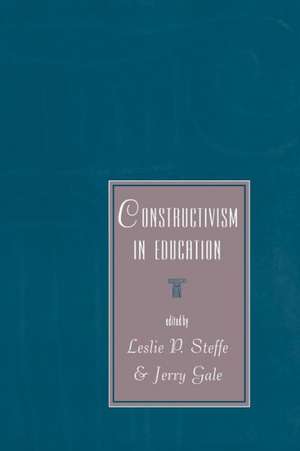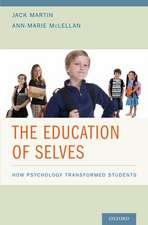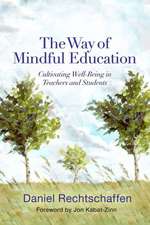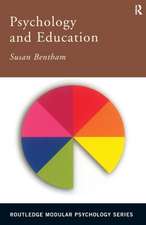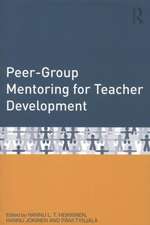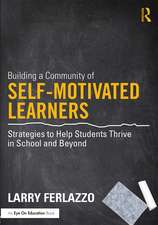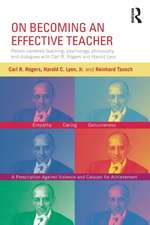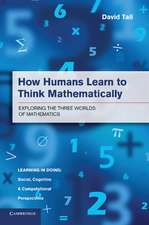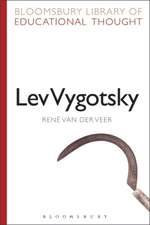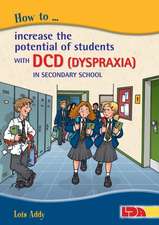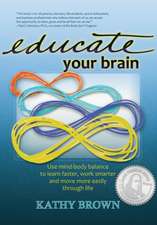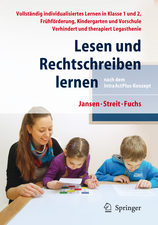Constructivism in Education
Editat de Leslie P. Steffe, Jerry Galeen Limba Engleză Paperback – 1995
This book examines key distinctions of various constructivist epistemologies, comparing and contrasting the various paradigms. Each section provides both keynote positions on a particular alternative paradigm as well as critical comments by respondents regarding that position. Several chapters also present a synthesis of the alternative epistemological perspectives.
| Toate formatele și edițiile | Preț | Express |
|---|---|---|
| Paperback (1) | 653.99 lei 6-8 săpt. | |
| Taylor & Francis – 1995 | 653.99 lei 6-8 săpt. | |
| Hardback (1) | 1345.16 lei 6-8 săpt. | |
| Taylor & Francis – 1995 | 1345.16 lei 6-8 săpt. |
Preț: 653.99 lei
Preț vechi: 769.41 lei
-15% Nou
Puncte Express: 981
Preț estimativ în valută:
125.16€ • 130.18$ • 103.32£
125.16€ • 130.18$ • 103.32£
Carte tipărită la comandă
Livrare economică 15-29 aprilie
Preluare comenzi: 021 569.72.76
Specificații
ISBN-13: 9780805810967
ISBN-10: 080581096X
Pagini: 596
Dimensiuni: 152 x 229 x 38 mm
Greutate: 0.79 kg
Ediția:New.
Editura: Taylor & Francis
Colecția Routledge
Locul publicării:Oxford, United Kingdom
ISBN-10: 080581096X
Pagini: 596
Dimensiuni: 152 x 229 x 38 mm
Greutate: 0.79 kg
Ediția:New.
Editura: Taylor & Francis
Colecția Routledge
Locul publicării:Oxford, United Kingdom
Public țintă
ProfessionalCuprins
Contents: J. Gale, Preface. Part I:Radical Constructivism and Social Constructionism. E. von Glasersfeld, A Constructivist Approach to Teaching. K.J. Gergen, Social Construction and the Educational Process. J. Shotter, In Dialogue: Social Constructionism and Radical Constructivism. J. Richards, Construct[ion/iv]ism: Pick One of the Above. Part II:Information-Processing Constructivism and Cybernetic Systems. F. Steier, From Universing to Conversing: An Ecological Constructionist Approach to Learning and Multiple Description. R.J. Spiro, P.J. Feltovich, M.J. Jacobson, R.L. Coulson, Cognitive Flexibility, Constructivism, and Hypertext: Random Access Instruction for Advanced Knowledge Acquisition in Ill-Structured Domains. K. Tomm, Response to Chapters by Spiro et al. and Steier. P.W. Thompson, Constructivism, Cybernetics, and Information Processing: Implications for Technologies of Research on Learning. Part III:Social Constructivism and Sociocultural Approaches. H. Bauersfeld, The Structuring of the Structures: Development and Function of Mathematizing as a Social Practice. J.V. Wertsch, C. Toma, Discourse and Learning in the Classroom: A Sociocultural Approach. C. Konold, Social and Cultural Dimensions of Knowledge and Classroom Teaching. J. Confrey, How Compatible Are Radical Constructivism, Sociocultural Approaches, and Social Constructivism? Analysis and Synthesis I: Alternative Epistemologies. M.H. Bickhard, World Mirroring Versus World Making: There's Gotta Be a Better Way. Part IV:Alternative Epistemologies in Language, Mathematics, and Science Education. R. Duit, The Constructivist View: A Fashionable and Fruitful Paradigm for Science Education Research and Practice. G.B. Saxe, From the Field to the Classroom: Studies in Mathematical Understanding. N.N. Spivey, Written Discourse: A Constructivist Perspective. T. Wood, From Alternative Epistemologies to Practice in Education: Rethinking What It Means to Teach and Learn. E. Ackermann, Construction and Transference of Meaning Through Form. D. Rubin, Constructivism, Sexual Harassment, and Presupposition: A (Very) Loose Response to Duit, Saxe, and Spivey. Part V:Alternative Epistemologies in Clinical, Mathematics, and Science Education. E. von Glasersfeld, Sensory Experience, Abstraction, and Teaching. R. Driver, Constructivist Approaches to Science Teaching. T. Wood, P. Cobb, E. Yackel, Reflections on Learning and Teaching Mathematics in Elementary School. P. Lewin, The Social Already Inhabits the Epistemic: A Discussion of Driver; Wood, Cobb, and Yackel; and von Glasersfeld. J. Becker, M. Varelas, Assisting Construction: The Role of the Teacher in Assisting the Learner's Construction of Preexisting Cultural Knowledge. E.H. Auerswald, Shifting Paradigms: A Self-Reflective Critique. Analysis and Synthesis II: Epsitemologies in Education. P. Ernest, The One and the Many. Analysis and Synthesis III: Retrospective Comments and Future Prospects. L.P. Steffe, Alternative Epistemologies: An Educator's Perspective. J. Gale, Epilogue.
